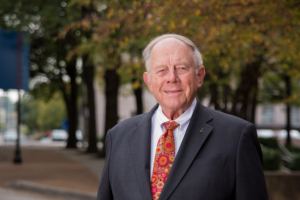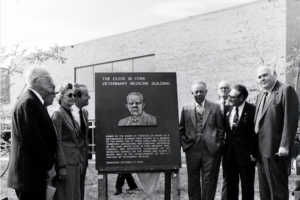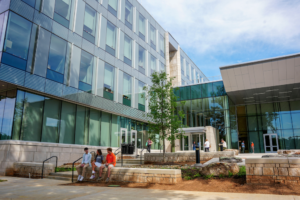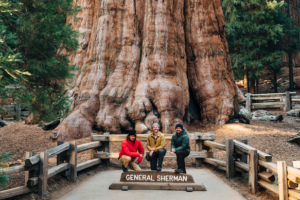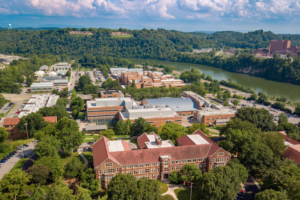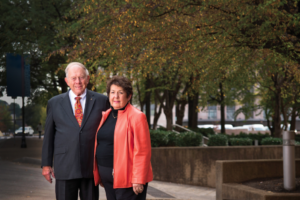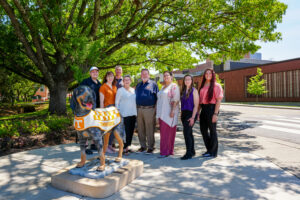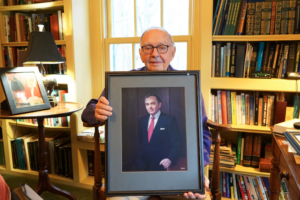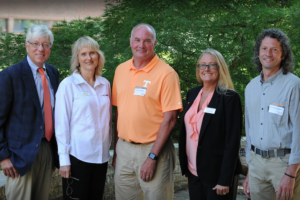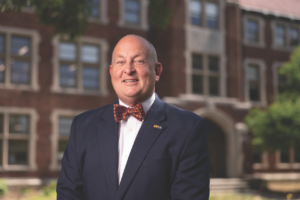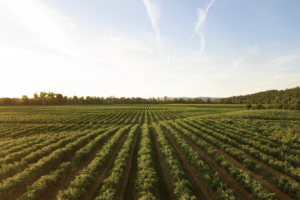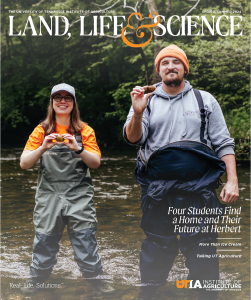
The meaning of the university’s land-grant mission, demands for multifaceted graduates, and the importance of the College of Veterinary Medicine and Herbert College of Agriculture were all topics of discussion when Keith Carver, UTIA senior vice chancellor and senior vice president, and Donde Plowman, chancellor of the University of Tennessee, Knoxville, sat down for a chat.
Keith Carver: Chancellor, you’ve talked quite a bit about the modern land-grant university. What does that mean?
Donde Plowman: You know, I love that terminology. Agriculture schools have exemplified the land-grant model for more than a hundred years of faculty and colleges being out in the state helping farmers learn from their research and helping them be more productive in what they do. I think of the modern land-grant university as one where faculty in other disciplines also follow that model. A new bridge in Morgan County, Tennessee, is a great example of this. Some of our biggest engineering researchers helped to create this bridge. They devised its surface and sensors that report how much weight load is on the bridge at any point in time. That’s the same model of engagement, and that’s how I think the modern land-grant can work.
Carver: In your time here, you’ve worked very closely with the Institute of Agriculture. How are we contributing to UT’s modern land-grant mission?
Plowman: For one, just the fact that we have a veterinary medicine college here is such an asset for UTIA, for this campus, for the entire University of Tennessee System, and the reputation that UTIA has in the state—a reputation that also includes the local impacts its ten AgResearch and Education Centers have. People in those communities know that they can get their problems solved, and that’s just such a great example for all the rest of us.
And I think back to the group we recently had here, the leaders of the world’s professional soccer organization, FIFA. The fact that our research scientist who is an expert in sports turf surfaces is going to spread that knowledge and be responsible for all the soccer fields to be used in FIFA World Cup 2026 is just amazing.
Carver: Oh, yes, that’s exciting for everyone. One of the things I see you do often as chancellor is talk with business and industry leaders. What are they telling you they want from our college graduates and, maybe even more specifically, some of the things you’re hearing in agriculture?
Plowman: So, one of the things that is hard for us in higher ed to get our heads around is that we offer degree programs within the silos that we’ve created. For example, an accounting student comes out of the accounting discipline, and what industry oftentimes tells us is they want people who are educated across college boundaries. So, envision a student who has taken, say, twelve hours in precision ag and an equal number of hours in business analytics, and communication and persuasion. I ask industry people all the time if they would hire students like that, and the answer is yes. Not everything has to be delivered that way, but in addition to certain majors, I think that integration is the way of the future. Employers all the time are saying that they don’t necessarily need exactly sixty hours in a certain subject, but how about somebody who has skills across boundaries?
In agriculture, so many different people are talking about sustainability. They’re talking about carbon neutral environments. There’s a lot of work underway at UTIA that really matches up with the work going on in engineering or over in physics and chemistry. So I think it’s a really exciting time to be doing this all together.
Carver: One hundred percent. Chancellor, we’re all hearing and seeing the record number of applications that are coming in for the University of Tennessee, Knoxville, and lots of students wanting to be on Rocky Top. What’s the secret sauce right now? Why is UT Knoxville being viewed as such a great place to go, and how do you see that benefiting agriculture?
Plowman: You know, we’ve gotten hot in the state and nationally, and it’s sort of like once there’s a story out there about a university, it’s, “Hey, you want to go there.” That’s what’s happening, and of course it doesn’t hurt that athletics is doing well. I will say, this is a fact, the night we beat Alabama, 2,000 applications dropped in the next twenty-four hours.
Carver: Immediately after the game?
Plowman: Yes, immediately, and many from out of state.
Carver: Well, you had a unique opportunity to work in Nebraska, and there’s a really good college of agriculture there. What do you think sets the Herbert College of Agriculture apart when you think about the University of Tennessee?
Plowman: Jim Herbert. I knew of Jim Herbert when I was in Nebraska. My boss, the previous chancellor, was on his board, and when that naming gift was announced here, it was breathtaking for people in agriculture in Nebraska because, at the time, it was one of the very first named colleges of agriculture.
That is absolutely a huge distinction because it shows that somebody who has the wealth to endow a college really values what’s happening here. It tells the whole world the college is even better than they thought.
Also, one of the special qualities of Herbert is that the students really like the feeling that they are part of a family. Although this is a big university with 36,000 students, many will say UT feels small, and I think no place on campus fosters that sense of community as well as Herbert does. Your students know each other, they know the faculty, they have special places to gather, and that’s really valuable. So, while I would like to see the enrollment grow, and so would you, we want to keep the feeling of being a small community where everybody knows each other and appreciates each other.
Carver: Finally, it seems like right now there’s an alignment in agriculture across the state, from the commodity groups, from Governor Bill Lee, from Commissioner Charlie Hatcher, from Tennessee Farm Bureau President Eric Mayberry, and the University of Tennessee. What’s your take on that?
Plowman: I think it’s 100 percent. I mean, we have a governor who is a farmer, who is so committed to agriculture. We have Charlie Hatcher, who is the head of the Department of Agriculture. We have Randy Boyd as the UT president. Donde and Keith over here running this operation. It’s a great alignment, and we feel the momentum of the agriculture industry all the time.
We know the industry is changing. We know it’s no longer so much the small family farms, but it’s a big industry with all sorts of needs that this university can meet. I think that’s our duty, our obligation, and I want us to excel in that.
Carver: Well, thank you so much for your time. It’s obvious you are very passionate about your role, and we appreciate your passion for agriculture.
Plowman: Well, thanks for letting me be part of this.
Explore More on
Features
MORE FROM THIS ISSUE

